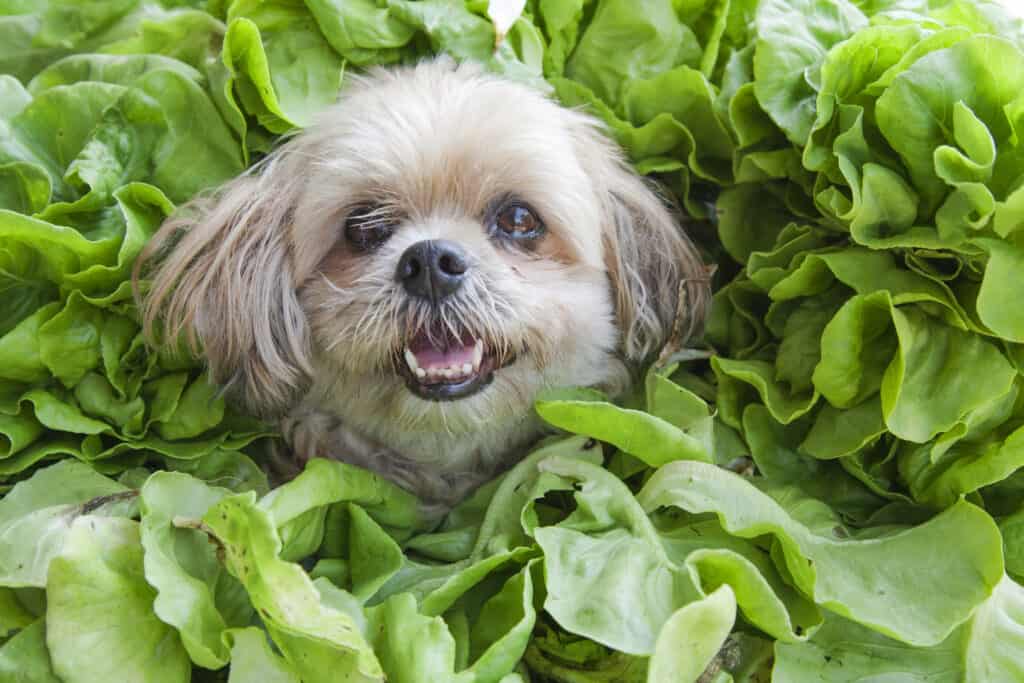Rosemary is a herb known for its distinctly fragrant taste and smell, and it also happens to be full of health benefits. It’s a great source of iron, calcium, vitamins A, C, and B-6, antioxidants, and anti-inflammatory compounds.
Rosemary adds flavor to foods, can be made into tea, or used as an essential oil. Some people use rosemary oil topically to promote hair growth, treat dry scalp, and relieve inflammation. However, not everything that is beneficial for humans is also good for animals, which may leave you wondering, can dogs safely eat rosemary?
The good news is that rosemary, at least in small quantities, can be safe for your dog to eat. Read on for the details.

Rosemary is a herb known for its distinctly fragrant taste and smell, and it also happens to be full of health benefits.
©iStock.com/Artfully79
What is Rosemary?
Rosemary is a perennial shrub native to the Mediterranean region that can grow three to six feet high. A second variety of rosemary is grown as a ground cover. The leaves are dark green and shiny, and the bluish leaves attract bees. The plant is resistant to most pests and diseases. You can pull rosemary leaves from the stems and chop them as either fresh or dried and use them to season foods.
Can You Offer Rosemary to Your Dog?
Luckily, dogs can safely eat rosemary, at least in limited amounts. The ASPCA lists rosemary as non-toxic to dogs, cats, and horses. But eating large amounts of the herb isn’t safe for humans or dogs. Ingesting too much rosemary can lead to stomach upset and indigestion.
How Much Rosemary Can You Give Your Dog?
Since rosemary is a non-toxic plant, if you have it as a shrub or ground cover growing in your garden, you needn’t worry about restricting your dog’s access to it.
As for how much rosemary to feed your dog if you decide you want to supplement your pup’s diet with fresh or dried rosemary, it’s best to check with your veterinarian to determine the correct amount to give. How much rosemary a dog can safely eat depends on their size. For example, the amount that’s best for a golden retriever will not be the same as what you would give a toy poodle.

The amount of rosemary that’s best for a golden retriever will not be the same as for a toy poodle, so best to first check with your veterinarian.
©Wirestock Creators/Shutterstock.com
Does Rosemary Have Health Benefits for Dogs?
Rosemary is a healthy source of vitamins, minerals, and antioxidants.
It can:
- Neutralize cell-damaging free radicals. Research has shown the antioxidants in rosemary support the immune system.
- Aid in digestion. The antimicrobial properties have been known to help digestive tract problems.
- Act as a natural preservative for food. Rosemary extract is used to prevent bacterial growth in food. (We’ll learn more about that later.)
Although rosemary has many health benefits, research hasn’t yet determined if the small amounts your dog can safely consume can provide many benefits. The verdict is there simply hasn’t been enough research conducted to determine if eating rosemary leaves provides dogs with health benefits.
If you’re concerned your dog is not getting a healthy diet, you can start by choosing a dog food with high-quality, whole ingredients. And remember, there isn’t one best dog food for every dog, as a dog’s nutritional needs vary based on factors such as age, size, breed, and activity levels.

If you’re concerned your dog is not getting a healthy diet, you can start by choosing a dog food with high-quality, whole ingredients.
©Africa Studio/Shutterstock.com
Don’t Give Your Dog Rosemary Essential Oil in Any Amounts
The essential oil of the rosemary plant is not the same as rosemary extract or the leaves from the plant. It’s not safe for your dog to ingest the highly concentrated oil. You should also avoid applying it to your dog’s coat and skin, as it can cause irritation.
What to Do If Your Dog Eats Too Much Rosemary?
If you’re concerned your dog ate a large amount of rosemary, or if your dog got into your rosemary essential oil, your dog will most likely end up with an upset stomach. In this case, we suggest giving your veterinarian a call. They may have you bring your pup in to be checked, or let you monitor him at home for the next 24 hours.
Why You May See Rosemary Extract as an Ingredient in Dog Food
Food manufacturers looking for ways to avoid chemicals are turning to natural substances to preserve food, such as rosemary extract. You may notice rosemary extract listed as an ingredient in your dog’s food. This isn’t due to the health benefits, but instead because the substance is used as a natural preservative.
Research has shown that rosemary extract helps keep food shelf-stable. This is due to compounds in the extract called polyphenols, which have antioxidant and antimicrobial properties. These compounds combine to contribute to the natural preservation of food.
What Other Herbs or Greens Are Safe for Dogs to Eat?
Dogs can benefit in the same way as people from eating a healthy diet filled with whole foods, including fresh vegetables and herbs.
Kale is chock full of fiber and iron. The fiber aids digestion, while the iron helps dogs maintain healthy red blood cells. However, be careful to only feed your dogs the leaves of kale. The stems are tough to digest and contain calcium oxalate, which can cause kidney stones.
Lettuce is safe in small amounts. Cut it into bite-sized pieces to avoid a choking hazard. Although because of its high water content, lettuce isn’t as nutritious as other greens, it is full of fiber and contains vitamins A and K.
Mint is another herb that is safe for dogs to eat sparingly. Be sure to check for dog-safe varieties. Some mint leaves, such as pennyroyal, are highly toxic to dogs. And just like with rosemary, be sure to avoid the essential oil as the concentration levels are too high for dogs to tolerate.
Spinach is full of fiber and nutrition. Cooked spinach is safe when given in moderate amounts. Raw spinach is too hard for dogs to digest. Don’t give spinach daily as it contains oxalic acid, which can build up and damage a dog’s kidneys.

Cooked spinach is safe for dogs when given in moderate amounts.
©sompong.j5d/Shutterstock.com
Never Give Your Dog These Foods
Remember, some foods are never safe for dogs to eat including chocolate, garlic, grapes, onions, poppy seeds, and rib bones. If your dog gets into any of these foods, give your vet a call, or take your pooch to the nearest emergency vet office.
Final Thoughts
Rosemary is a non-toxic herb for dogs. Sometimes used as a natural preservative in dog food, rosemary extract contains antimicrobial properties. Small amounts of rosemary are safe for your dog to eat, but there hasn’t been enough research to determine if giving your dog rosemary provides health benefits.
If your dog eats a few leaves of rosemary, there is no reason for alarm. But, you may need to call your vet if your dog gets into a large amount of the plant.
The photo featured at the top of this post is © Switlana Sonyashna/Shutterstock.com
Ready to discover the top 10 cutest dog breeds in the entire world?
How about the fastest dogs, the largest dogs and those that are -- quite frankly -- just the kindest dogs on the planet? Each day, AZ Animals sends out lists just like this to our thousands of email subscribers. And the best part? It's FREE. Join today by entering your email below.
Thank you for reading! Have some feedback for us? Contact the AZ Animals editorial team.






